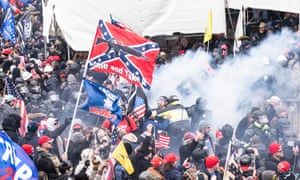Extract from The Guardian
After the Capitol violence, ‘bothsiderism’ from politicians such as Michael McCormack is genuinely dangerous
“It is unfortunate that we have seen the events at Capitol Hill, that we’ve seen in recent days – similar to those race riots that we saw around the country last year.”
That was Michael McCormack – Australia’s acting prime minister, no less.
Conservatives in Australia, like their co-thinkers in the US, have long performed extraordinary gyrations to avoid acknowledging the reality of rightwing extremism. Consider the reaction to a 2019 speech in which Mike Burgess, the director general of the Australian Security Intelligence Organisation, warned about the danger of fascist terrorism.
The home affairs minister, Peter Dutton, reacted to Burgess’s description of extremists meeting “in suburbs around Australia … to salute Nazi flags, inspect weapons, train in combat and share their hateful ideology” by telling journalists he was equally focused on leftwing extremists – a category not even mentioned in Asio’s report.
After the Capitol protest, this instinctive “bothsiderism” has become genuinely dangerous.
McCormack’s use of “unfortunate” implies, on face value, that the invasion of America’s chamber of government by fascists might be attributed to bad luck.
Just one of those things, apparently. Could have happened to anyone – and definitely bears no relationship to Donald Trump’s longstanding cultivation of a white nationalist fringe.
More importantly, the whataboutery of McCormack invocation of Black Lives Matter obscures the obvious point that the significance of the Capitol invasion lies not just in the actions of the Trump supporters but also in their rationale. Yes, other historical protests might have been violent too – but in Washington DC a crowd led by genuine fascists used force in an attempt to void an election.
Far-right extremists, some of them dressed in tactical gear with bulletproof vests and holstered guns, occupied the legislature on the behest of a defeated presidential candidate: a demonstration terrifying not just because of what they did but because of why they did it.
To put the issue bluntly, BLM mobilises against racism, whereas the Trump mob rallied in favour of it. The Capitol rampage was, to use McCormack’s terms, a “race riot”, a protest populated by a guy in a T-shirt celebrating Auschwitz, men waving Confederate flags, members of the white supremacist Proud Boys, and sundry neo-Nazi thugs.
The acting PM’s strange half-condemnation reflects the increasingly close relationship between American and Australian politics. If Trump refashioned the Republican party in his own image, he also reshaped conservatism in this country, fostering a new brashness in both the mainstream right and on the edges.
Let’s not forget how Scott Morrison received a medal after lauding the president as “a strong leader who says what he’s going to do and then goes and does it” – a description that perhaps sounds a little different after recent events.
Cory Bernardi launched his own party seeking to emulate The Donald, while Pauline Hanson saw the 2016 presidential election as vindication of her own program. Noisy backbenchers such as George Christensen and Craig Kelly enthused about the Trump campaign, while former PM Tony Abbott described Trump as a “very good president”.
In the media, Trumpism became de rigueur for shock jocks and trollumnists, with Sky News broadcasting a special show (the notorious Outsiders program) seemingly made for “Trump’s Aussie mates”. Even supposedly serious commentators such as the Australian’s Greg Sheridan came out as more than slightly Trump-curious.
On the far right, the effect was even more electric. Trump’s victory, coming just after the Reclaim Australia movement, emboldened the extremists of the United Patriots Front and spurred an imitative local “alt right”. Even the bizarre delusions of QAnon found a hearing (with one of Morrison’s family friends revealed as a key Q influencer) while the anti-lockdown derangement most evident in Victoria relied on the rhetoric of American conspiracies about a “plandemic”.
Most disturbingly, the perpetrator of the Christchurch massacre used his pre-murder manifesto to praise Trump as a “symbol of renewed white identity and common purpose”.
That’s why facing up honestly to the evolution of US politics and its local effects matters so much.
Since 2016, we’ve seen the mainstream and the fringe of the American right engaged in a mutual radicalisation, with the extremists emboldened by rhetoric from Fox News and Republican lawmakers, and the party as a whole pushed to the right by its genuinely fascist elements.
In the short term, the fiasco of 6 January might have demoralised those who participated in it, with several prominent rightists now facing years in jail.
But Trump still retains millions of supporters – and, on platforms like Gab and Parler, you can now find many of them talking increasingly openly about violence. The minority drifting closer and closer to over fascism have found, in the supposedly fraudulent victory by Joe Biden, their own “stab in the back” myth and the death of Ashli Babbitt, the QAnon supporter shot by police, a contemporary Horst Wessel.
The turmoil in the US is not over. It’s barely begun.
Extremists in Australia remain much more isolated and disorganised than their American counterparts. But, in the current context, their relative isolation might even make them more dangerous by fostering a belief in individual terrorism as their only political option.
The New Zealand royal commission into the Christchurch massacre attributed the perpetrator’s radicalisation to YouTube and 8chan, platforms on which he absorbed the ideas of the American fascist right. But it also made clear just how closely the shooter followed developments in Australian politics.
The mass murders committed in New Zealand by a young Australian fascist back in 2019 prompted remarkably little reflection. That’s why it’s all the more urgent for a genuine assessment of Trump’s influence here.

No comments:
Post a Comment